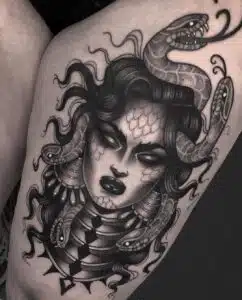Tattoos had been a vital part of human subculture for centuries, serving as powerful styles of self-expression, art, and symbolism. The Medusa tattoo is a fascinating tattoo design that has gained a reputation in current years. Derived from Greek mythology, the Medusa tattoo holds a charming mix of appeal and fear, making it an interesting preference for those seeking unique and meaningful body art. Medusa Tattoos gained popularity due to the movement removing the stigma associated with assault and abuse in women. Let us see the history, symbolism, medusa tattoo meaning, and its artistic aspects to infer the powerful message behind this captivating ink. Also, check out Medusa tattoo side effects.
Medusa Tattoo: The Mythical Origin
In Greek mythology, Medusa was a young and beautiful woman and one of the three Gorgon sisters, cursed by the gods after Poseidon violated her in the temple of Athena. The goddess of war and wisdom converted her into Gorgon, a winged monster with venomous snakes as hair. Medusa was a formidable and terrifying creature that could turn everyone into stone by just looking at them. The hero Perseus, in the end, slayed her, using her severed head as a weapon, and turning her into stone statues that were said to be scattered across the land.
Why Medusa Tattoo is popular on TikTok?
People have been getting Medusa tattoos as a symbol of strength and power. Few survivors of sexual assault have used the Medusa tattoo to fight back against the story of the victim being punished for their assault. Even on TikTok, the Medusa tattoo became popular, and people shared their tattoos with their own personal meanings. The Medusa tattoo’s meaning is subjective and personal to every individual. Let us see below the meaning of the Medusa tattoo and what it symbolizes.
Medusa Tattoo Meaning & Symbolism
The Medusa tattoo carries a range of meanings, drawing from its mythological origins and more contemporary interpretations. Medusa represents protection to women and generally means survival, strength, courage, and overcoming assault, including sexual assault.
Some of the key Medusa tattoo meaning include:
Empowerment and Resilience:
The Medusa tattoo symbolizes strength and resilience. Medusa, despite her tragic fate, is portrayed as a powerful figure. Wearing a Medusa tattoo meaning is a reminder of one’s ability to overcome adversity and face challenges with strength and determination.
Woman Power:
In modern times, the Medusa tattoo has been embraced as a symbol of female empowerment. It challenges traditional stereotypes and negative portrayals of powerful women. The tattoo represents a woman’s strength, courage, and assertiveness, encouraging the celebration of feminine power.
Protection:
Medusa’s gaze was said to turn enemies to stone. As a tattoo, it can be seen as a protective talisman, warding off negativity and harmful influences. Some wearers see the Medusa tattoo as a symbol of protection against those who might wish them harm. Medusa also reflects protection for women who experienced assault.
Beauty in Darkness:
Medusa’s story is one of tragedy and transformation. The tattoo embodies the idea that beauty can exist even in the darkest places, and one can embrace their flaws and unique traits, leading to personal growth and self-acceptance.
Rebirth and Transformation:
Medusa’s origin story involves her transformation into a Gorgon. As such, the tattoo can symbolize a personal journey of transformation or rebirth, overcoming one’s past, or evolving into a new and stronger version of oneself.
Mystique and Allure:
The captivating gaze and serpent hair of Medusa lends an air of mystery and allure to the tattoo. Some people choose the Medusa tattoo simply for its striking and attention-grabbing appearance and not for Medusa tattoo meaning.
Medusa Tattoos Artistic Variations
The Medusa tattoo can be interpreted and designed in various ways, leaving room for individual creativity and expression. Some common artistic variations include:

Traditional Medusa:
Staying true to her Greek origins, a traditional Medusa tattoo often depicts her fierce face with serpent hair and intense eyes.
Neo-Traditional Medusa:
This style combines traditional elements with modern techniques, adding vibrant colors and intricate details.
Realistic Medusa:
For those seeking a more lifelike representation, a realistic Medusa tattoo can be created with meticulous attention to detail, capturing her gaze and serpent hair in stunning precision.
Medusa Portrait:
Some opt for a portrait-style tattoo, focusing on Medusa’s face and mesmerizing eyes, which are alluring and captivating.
Symbolic Elements:
Many individuals incorporate additional symbolic elements into their Medusa tattoos, such as roses to represent beauty or serpents as a symbol of transformation and rebirth.
Medusa Tattoo Side Effects
Getting a tattoo involves the injection of ink into the dermal layer of the skin. While most people do not experience significant issues, there may be potential tattoo side effects and risks associated with the process. There is no direct evidence suggesting that getting a Medusa tattoo specifically has any unique health implications compared to other tattoo designs. The health considerations for a Medusa tattoo would be the same as for any other tattoo.
Here are some general points to keep in mind to avoid tattoo side effects:
Infection as Tattoo Side Effects
The risk of infection is one of the primary concerns with getting any tattoo done. The signs of infection include redness, warmth, pus, or fever. Skin infections are mostly associated with bacterial infections like Staphylococcus aureus or Streptococcus pyogenes (1).
To minimize this risk, it is always advisable to select a reputable and licensed tattoo artist who follows proper hygiene practices and uses sterilized equipment.
Further, there might be a minimal risk of contracting bloodborne diseases like hepatitis B, hepatitis C, or HIV if the tattoo equipment is not properly sterilized.
Allergic Reactions as Tattoo Side Effects
Some people may be sensitive or allergic to certain tattoo ink ingredients. For instance, 21 people in Poland reported hypersensitivity reactions, out of which 18 were triggered by red ink (2).
You must discuss any known allergies with your tattoo artist beforehand, and they may be able to use alternative inks if needed.
Pain & Discomfort as Tattoo Side Effects
Tattooing involves the use of needles, and pain or discomfort during and after the process is common. The level of pain varies depending on the individual’s pain tolerance and the tattoo’s location.
Aftercare to Prevent Tattoo Side Effects
Proper aftercare is required for tattoo healing and to avoid complications such as infection or scarring. Some people are prone to keloid formation, a thick raised scar. One has to follow instructions given by the tattoo artist carefully.
Existing Health Or Skin Conditions
If you have any pre-existing skin conditions or medical conditions that affect your immune system, it’s essential to consult with your healthcare provider before getting a tattoo done.
If there is an existing skin condition like psoriasis or eczema, or atopic dermatitis, and pyoderma gangrenosum, there may be a risk of exacerbating the same after tattooing (1).
MRI Interference
Tattoos with certain metallic pigments may interfere with or cause complications during MRI scans. This needs to be informed to the healthcare provider about your tattoo if you need to undergo an MRI in the future.
Emotional Impact as Tattoo Side Effects
It’s important to consider the emotional impact of getting a tattoo, as it is a permanent decision. It is advisable not to get it done in haste but to think enough to ensure you are fully comfortable with the design and its significance to you.
How to Prevent Tattoo Side Effects?
To minimize the risks and potential side effects of getting a tattoo, consider the following:
Choose a reputable and professional tattoo artist who follows strict hygiene practices.
- Follow proper aftercare instructions given by your tattoo artist to prevent infections and promote proper healing.
- Avoid tattooing over existing skin conditions or areas with open wounds.
- Inform your tattoo artist about any known allergies or health conditions you may have.
- If you’re concerned about tattoo ink ingredients, discuss it with your tattoo artist before the procedure.
As with any tattoo, taking the time to research and find a skilled and experienced tattoo artist who prioritizes safety and hygiene is crucial.
Conclusion
The Medusa tattoo is a powerful and thought-provoking symbol. The tattoo embodies strength, resilience, and the celebration of female power. It’s important to note that tattoo meanings can be highly personal and can vary from person to person. The significance of a Medusa tattoo may differ depending on the individual’s experiences, beliefs, and intentions behind getting the tattoo. Before getting any tattoo, it’s essential to carefully consider its meaning and symbolism to ensure it resonates with you on a profound level. One has to remember that tattoos are permanent, so it’s essential to think carefully about your decision and choose a design that holds personal meaning to you. The side effects and risks associated with tattoos are generally low if you choose a skilled and experienced tattoo artist who prioritizes safety and hygiene. If you have any specific health concerns or conditions, it’s always best to consult with a healthcare professional before getting a tattoo.
Sources
Related Posts

K3 Spark Mineral Reviews, Ingredients, Benefits, Risks of Mystery Pills & Gummies for Weight loss


MCT Wellness Reviews, Ingredients, Side Effects – Is Dr. Gundry MCT Wellness a Hoax?

Scorolash Reviews – Is the Eyelash Growth Serum Worth the Hype?

Tretinoin vs Retinol – Which retinoid safer to prevent skin aging?


